14 start with P start with P

What parent hasn’t wondered “What do I do now?” as a baby cries or a teenager glares? Making babies may come naturally, but knowing how to raise them doesn’t. As primatologist-turned-psychologist Harriet J. Smith shows in this lively safari through the world of primates, parenting by primates isn’t instinctive, and that’s just as true for monkeys and apes as it is for humans.
In this natural history of primate parenting, Smith compares parenting by nonhuman and human primates. In a narrative rich with vivid anecdotes derived from interviews with primatologists, from her own experience breeding cotton-top tamarin monkeys for over thirty years, and from her clinical psychology practice, Smith describes the thousand and one ways that primate mothers, fathers, grandparents, siblings, and even babysitters care for their offspring, from infancy through young adulthood.
Smith learned the hard way that hand-raised cotton-top tamarins often mature into incompetent parents. Her observation of inadequate parenting by cotton-tops plus her clinical work with troubled human families sparked her interest in the process of how primates become “good-enough” parents. The story of how she trained her tamarins to become adequate parents lays the foundation for discussions about the crucial role of early experience on parenting in primates, and how certain types of experiences, such as anxiety and social isolation, can trigger neglectful or abusive parenting.
Smith reveals diverse strategies for parenting by primates, but she also identifies parenting behaviors crucial to the survival and development of primate youngsters that have stood the test of time.
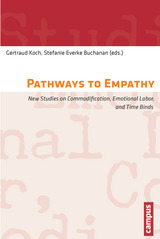
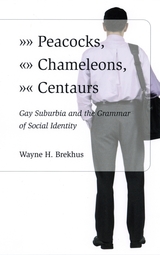
In this first-ever ethnography of American gay suburbanites, Wayne H. Brekhus demonstrates that who one is depends at least in part on where and when one is. For many urban gay men, being homosexual is key to their identity because they live, work, and socialize in almost exclusively gay circles. Brekhus calls such men "lifestylers" or peacocks. Chameleons or "commuters," on the other hand, live and work in conventional suburban settings, but lead intense gay social and sexual lives outside the suburbs. Centaurs, meanwhile, or "integrators," mix typical suburban jobs and homes with low-key gay social and sexual activities. In other words, lifestylers see homosexuality as something you are, commuters as something you do, and integrators as part of yourself.
Ultimately, Brekhus shows that lifestyling, commuting, and integrating embody competing identity strategies that occur not only among gay men but across a broad range of social categories. What results, then, is an innovative work that will interest sociologists, psychologists, anthropologists, and students of gay culture.
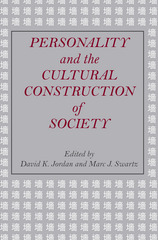
Pyschological anthropology is a vital area of contemporary social science, and one of the field's most important and innovative thinkers is Melford E. Spiro. This volume brings together sixteen essays that review Spiro's theoretical insights and extend them into new areas. The essays center on several general problems: In what ways is it meaningful to speak of a social act as having "functions"? What elements and processes of human personality are universal, and why? What is the relationship between religion and personality? Why? What are the pyschological underpinnings of social manipulation?
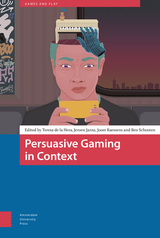
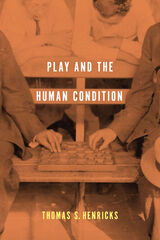
Imaginative and stimulating, Play and the Human Condition shows how play allows us to learn about our qualities and those of the world around us--and in so doing make sense of ourselves.

"Read him his rights." We all recognize this line from cop dramas. But what happens afterward? In this book, Richard Leo sheds light on a little-known corner of our criminal justice system--the police interrogation.
Incriminating statements are necessary to solve crimes, but suspects almost never have reason to provide them. Therefore, as Leo shows, crime units have developed sophisticated interrogation methods that rely on persuasion, manipulation, and deception to move a subject from denial to admission, serving to shore up the case against him. Ostensibly aimed at uncovering truth, the structure of interrogation requires that officers act as an arm of the prosecution.
Skillful and fair interrogation allows authorities to capture criminals and deter future crime. But Leo draws on extensive research to argue that confessions are inherently suspect and that coercive interrogation has led to false confession and wrongful conviction. He looks at police evidence in the court, the nature and disappearance of the brutal "third degree," the reforms of the mid-twentieth century, and how police can persuade suspects to waive their Miranda rights.
An important study of the criminal justice system, Police Interrogation and American Justice raises unsettling questions. How should police be permitted to interrogate when society needs both crime control and due process? How can order be maintained yet justice served?

In the wake of September 11, the American public has been besieged with claims that politics is driven by personality. Saddam Hussein, Osama bin Laden, Kim Chong-Il, Ayatollah Khameinei-America's political rogues' gallery is populated by individuals whose need for recognition supposedly drives their actions on the world stage. How does personality actually drive politics? And how is personality, in turn, formed by political environment? Political Psychology in International Relations provides students and scholars with the analytical tools they need to answer these pressing questions, and to assess their implications for policy in a real and sometimes dangerous world.
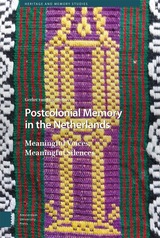

Psychology is the dogma of our age; psychotherapy is our means of self-understanding; and "repressed memory" is now a universally familiar form of trauma. Jeffrey Prager, who is both a sociologist and a psychoanalyst, explores the degree to which we manifest the clichés of our culture in our most private recollections.
At the core of Presenting the Past is the dramatic and troubling case of a woman who during the course of her analysis began to recall scenes of her own childhood sexual abuse. Later the patient came to believe that the trauma she remembered as a physical violation might have been an emotional violation and that she had composed a memory out of present and past relationships. But what was accurate and true? And what evidence could be persuasive and valuable? Could the analyst trust either her convictions or his own? Using this case and others, Prager explores the nature of memory and its relation to the interpersonal, therapeutic, and cultural worlds in which remembering occurs.
Synthesizing research from social science, psychoanalysis, neuroscience, and cognitive psychology, Prager uses clinical examples to argue more generally that our memories are never simple records of events, but constantly evolving constructions, affected by contemporary culture as well as by our own private lives. He demonstrates the need that sociology has for the insights of psychoanalysis, and the need that psychoanalysis has for the insights of sociology.
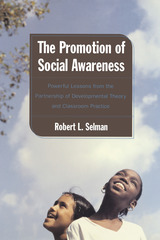
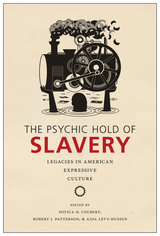

"The conversation between political psychology and constructivism is essential and long overdue. By exploring the interaction of individual cognition and social processes, this 'ideational alliance' more fully explains how ideas work all the way down to shape world politics."
---Theo Farrell, King's College London
"This is a worthwhile and engaging volume. Political psychology is gaining ground as an essential perspective to consider when analyzing international relations, and the book's focus on constructivism provides key insights into the relationship between identity, norms, and behavior---bedrock concepts in understanding the social underpinnings of global politics."
---Mira Sucharov, Carleton University
"An indispensable guide to understanding what distinguishes and what unites psychology and constructivism. A wonderful resource for political psychologists, constructivists, and their critics."
---Jonathan Mercer, University of Washington
Constructivist IR scholars study the ways in which international norms, culture, and identities---all intersubjective phenomena---inform foreign policy and affect the reaction to and outcomes of international events. Political psychologists similarly investigate divergent national self-conceptions as well as the individual cognitive and emotional propensities that shape ideology and policy. Given their mutual interest in human subjectivity and identity politics, a dialogue and synthesis between constructivism and political psychology is long overdue.
The contributors to this volume discuss both theoretical and empirical issues of complementarity and critique, with an emphasis on the potential for integrating the viewpoints within a progressive ideational paradigm. Moreover, they make a self-conscious effort to interrogate, rather than gloss over, their differences in the hope that such disagreements will prove particularly rich sources of analytical and empirical insight.
Jacket illustration © Ocean Photography/Veer
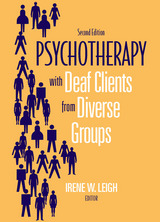
The second edition of Psychotherapy with Deaf Clients from Diverse Groups features the introduction of six new chapters that complement full revisions of original chapters with advances in the field since its initial publication. The first part begins with a new chapter on the current ethical issues relevant to working with deaf clients. In subsequent chapters it provides updated information on the diversity of consumer knowledge, attitudes, beliefs, and experiences. Deaf therapists and their involvement in the Deaf community also are scrutinized in this context.
The revised second part examines psychotherapy for various constituencies, including deaf women; lesbian, gay, and bisexual deaf populations; children of deaf parents; and people with Usher syndrome. Part Three chapters consider interventions with African American deaf clients, American Indians who are deaf, and Asians who are American and deaf. A new chapter expands information on therapy for Latino deaf clients.
The final section incorporates three new chapters on other deaf populations — deaf college students, recipients of cochlear implants, and deaf elderly clients. Also, new information has been added to chapters on the treatment of deaf survivors of sexual abuse and deaf clients with chemical dependency. The last addition to the second edition outlines dialectical behavior therapy for deaf clients, a valuable option for clinicians.
READERS
Browse our collection.
PUBLISHERS
See BiblioVault's publisher services.
STUDENT SERVICES
Files for college accessibility offices.
UChicago Accessibility Resources
home | accessibility | search | about | contact us
BiblioVault ® 2001 - 2024
The University of Chicago Press









